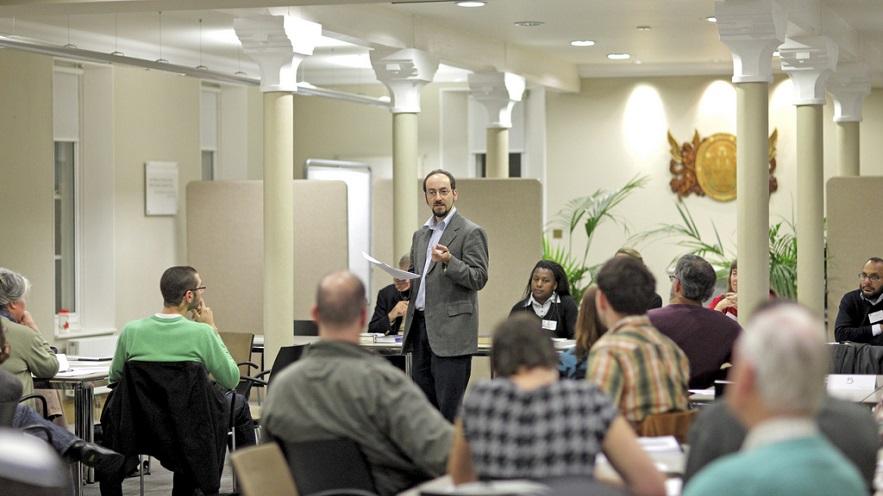
What is Scriptural Reasoning?
Scriptural Reasoning is an interactive practice in which people from different backgrounds read and discuss short scriptural texts together. Scriptural Reasoning is becoming increasingly popular, and groups are now found throughout the world. Many groups are made up of participants from Jewish, Christian, and Muslim backgrounds, who meet to read texts from the Bible and the Quran. Other Scriptural Reasoning groups have participants from other backgrounds, including people who do not identify with any religious faith.
Scriptural Reasoning's focus on texts enables a rich conversation without presuming that everyone has the same areas of expertise or that they agree on theological issues. All participants are encouraged to share their thoughts about each text, regardless of whether they think of it as their own scripture or not. By listening to other people talk about the text, participants have the opportunity to learn how other participants think and reason. Scriptural Reasoning also enables people to become more familiar with other religious traditions through hands-on engagement.
Past participants in CIP Scriptural Reasoning sessions have reported that Scriptural Reasoning "inspires greater peace and understanding" and gets beyond "superfluous talk about our beliefs and their similarities," as well as providing opportunities to "talk with people you may not usually talk to.”
Scriptural Reasoning and the Cambridge Interfaith Programme
The Cambridge Interfaith Programme was one of the pioneers of Scriptural Reasoning, and has introduced many people to the practice at events over the years. CIP has also hosted a number of academic conferences using the practice of Scriptural Reasoning, bringing scholars together for a unique variety of interdisciplinary academic collaboration.
CIP continues to work with one of our key partners, the Rose Castle Foundation (external link), to organise Scriptural Reasoning events.
History of Scriptural Reasoning
Scriptural Reasoning originally grew by accident through friendships between Jews, Muslims, and Christians. In the early 1990s, scholars of modern Jewish philosophy and rabbinic texts began meeting together to read and study, a practice they called Textual Reasoning. The aim was to grow in understanding of the scholars' different disciplines, and to discuss key questions about Judaism in the present and future. In the mid 1990s, some Christian friends began sitting in on these conversations, and were so attracted by the lively process that they suggested using it as a model for interfaith conversation. Later, Muslim friends were invited to join the conversation, and Scriptural Reasoning was born.
Find out more about Scriptural Reasoning
Because Scriptural Reasoning is a participatory practice, each SR group is unique. Different groups around the world practice Scriptural Reasoning in different ways, and even in established groups, the practice continues to evolve.
Learn more about Scriptural Reasoning via ScripturalReasoning.org. If you are interested in starting a group in your area, the Rose Castle Foundation can offer guidance and assistance.
Some academic reflections have been published in the Journal of Scriptural Reasoning (jsr.lib.virginia.edu), as well as in other journals and books.
